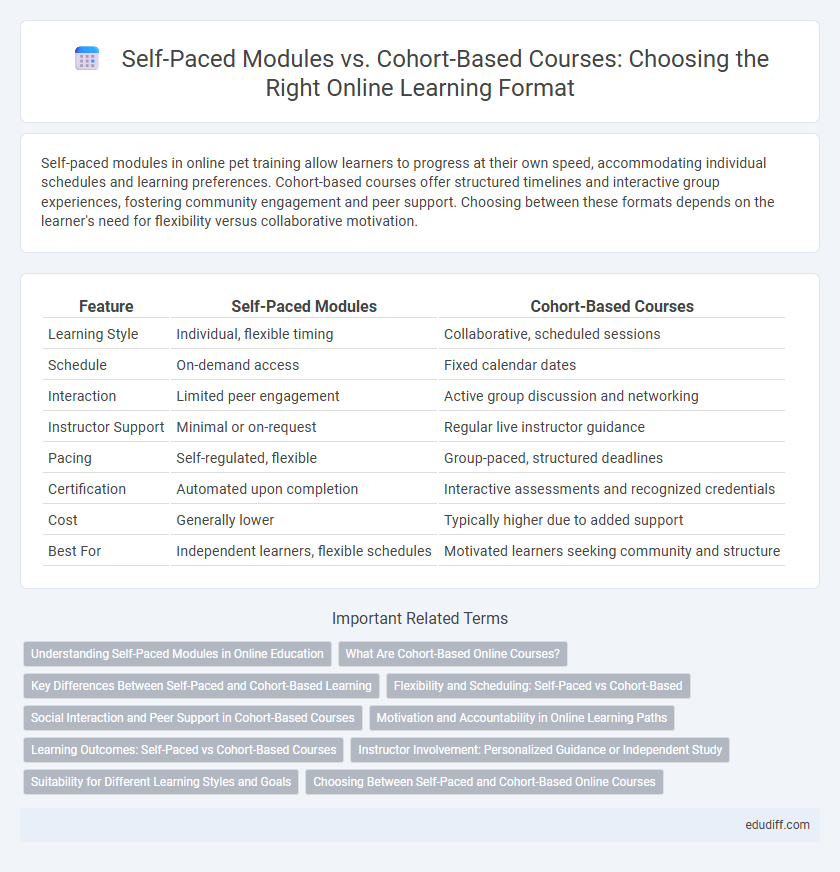Self-paced modules in online pet training allow learners to progress at their own speed, accommodating individual schedules and learning preferences. Cohort-based courses offer structured timelines and interactive group experiences, fostering community engagement and peer support. Choosing between these formats depends on the learner's need for flexibility versus collaborative motivation.
Table of Comparison
| Feature | Self-Paced Modules | Cohort-Based Courses |
|---|---|---|
| Learning Style | Individual, flexible timing | Collaborative, scheduled sessions |
| Schedule | On-demand access | Fixed calendar dates |
| Interaction | Limited peer engagement | Active group discussion and networking |
| Instructor Support | Minimal or on-request | Regular live instructor guidance |
| Pacing | Self-regulated, flexible | Group-paced, structured deadlines |
| Certification | Automated upon completion | Interactive assessments and recognized credentials |
| Cost | Generally lower | Typically higher due to added support |
| Best For | Independent learners, flexible schedules | Motivated learners seeking community and structure |
Understanding Self-Paced Modules in Online Education
Self-paced modules in online education allow learners to access content and complete coursework at their own speed, offering flexibility unmatched by cohort-based courses. These modules use multimedia resources, interactive quizzes, and adaptive learning technologies to cater to diverse learning styles and paces, enhancing knowledge retention. The asynchronous structure supports continuous learning and enables students to revisit materials anytime, fostering deeper comprehension.
What Are Cohort-Based Online Courses?
Cohort-based online courses involve a group of learners progressing through the curriculum together, fostering collaboration and peer interaction to enhance understanding and motivation. These courses feature scheduled sessions, live discussions, and deadlines that create a structured learning environment distinct from self-paced modules. Platforms like MasterClass and Coursera offer cohort-based formats that encourage accountability and real-time feedback, improving completion rates and learner engagement.
Key Differences Between Self-Paced and Cohort-Based Learning
Self-paced modules offer learners flexibility to study at their own speed, accommodating varied schedules and personal learning preferences, while cohort-based courses emphasize structured timelines and collaborative engagement to build peer support and accountability. Self-paced learning typically features asynchronous content access, enabling individualized progression without real-time interaction, whereas cohort-based learning involves synchronous sessions that foster real-time discussions and immediate feedback. The key differences impact learner motivation, engagement levels, and suitability for different educational goals, with self-paced favoring autonomy and cohort-based promoting social learning dynamics.
Flexibility and Scheduling: Self-Paced vs Cohort-Based
Self-paced modules offer unmatched flexibility by allowing learners to progress according to their individual schedules, accommodating varying paces and time commitments. Cohort-based courses require synchronized participation, creating fixed schedules that promote peer interaction but limit personal time management. Choosing between these formats depends on one's need for adaptable timing versus structured, collaborative learning environments.
Social Interaction and Peer Support in Cohort-Based Courses
Cohort-based courses foster enhanced social interaction by grouping learners who progress through content simultaneously, promoting real-time discussions and collaborative learning. Peer support is integral as students share insights, provide feedback, and motivate each other, creating a dynamic and engaging educational environment. This communal approach contrasts with self-paced modules, where isolated learning can limit opportunities for networking and immediate peer engagement.
Motivation and Accountability in Online Learning Paths
Self-paced modules empower learners with flexibility, allowing tailored progress but often lack external accountability, which can diminish motivation. Cohort-based courses foster community engagement and structured deadlines, enhancing accountability and sustained motivation through peer interaction. Balancing these approaches optimizes learner commitment and course completion rates in online education.
Learning Outcomes: Self-Paced vs Cohort-Based Courses
Self-paced modules enable learners to progress at their own speed, often resulting in personalized comprehension and mastery of materials. Cohort-based courses promote collaborative learning and accountability, which can enhance motivation and retention through peer interactions. Studies indicate that cohort-based courses typically yield higher completion rates and improved application of knowledge due to structured schedules and group support.
Instructor Involvement: Personalized Guidance or Independent Study
Cohort-based courses offer significant instructor involvement, providing personalized guidance through live sessions, real-time feedback, and collaborative discussions that enhance learning outcomes. Self-paced modules emphasize independent study, allowing learners to progress at their own speed without direct interaction with instructors, making them ideal for flexible schedules. Personalized support in cohort-based courses fosters deeper understanding, while self-paced modules require greater self-motivation and discipline.
Suitability for Different Learning Styles and Goals
Self-paced modules cater to independent learners who prefer flexibility and the ability to control their study schedule, ideal for those balancing work or personal commitments. Cohort-based courses support collaborative and structured learning environments, benefiting individuals who thrive on peer interaction and real-time feedback. Understanding these distinctions helps learners select formats that align with their goals, whether mastering content at their own speed or engaging in a community-driven educational experience.
Choosing Between Self-Paced and Cohort-Based Online Courses
Self-paced modules offer flexibility for learners to progress at their own convenience, ideal for individuals balancing work and personal commitments. Cohort-based courses provide structured schedules and peer interaction, enhancing motivation and accountability through collaborative learning environments. Selecting between these formats depends on your learning style, time availability, and preference for community engagement versus independent study.
Self-paced modules vs Cohort-based courses Infographic

 edudiff.com
edudiff.com